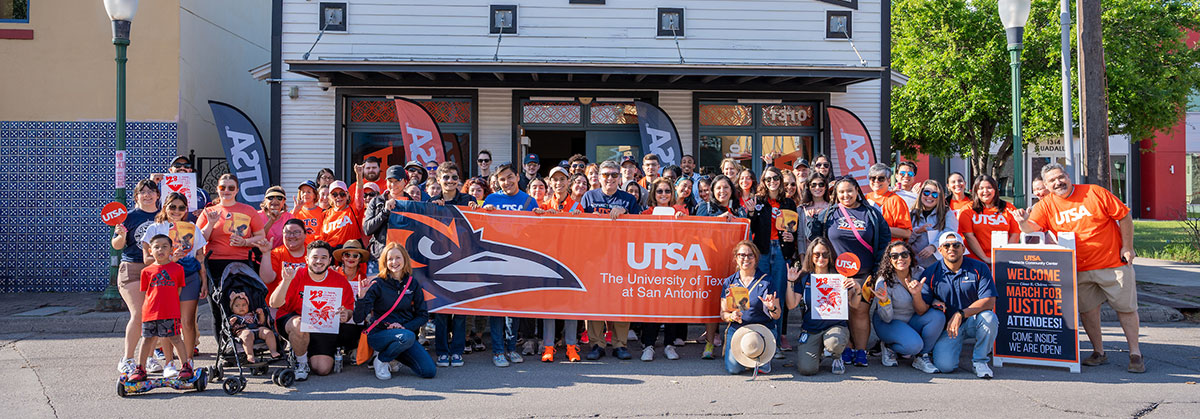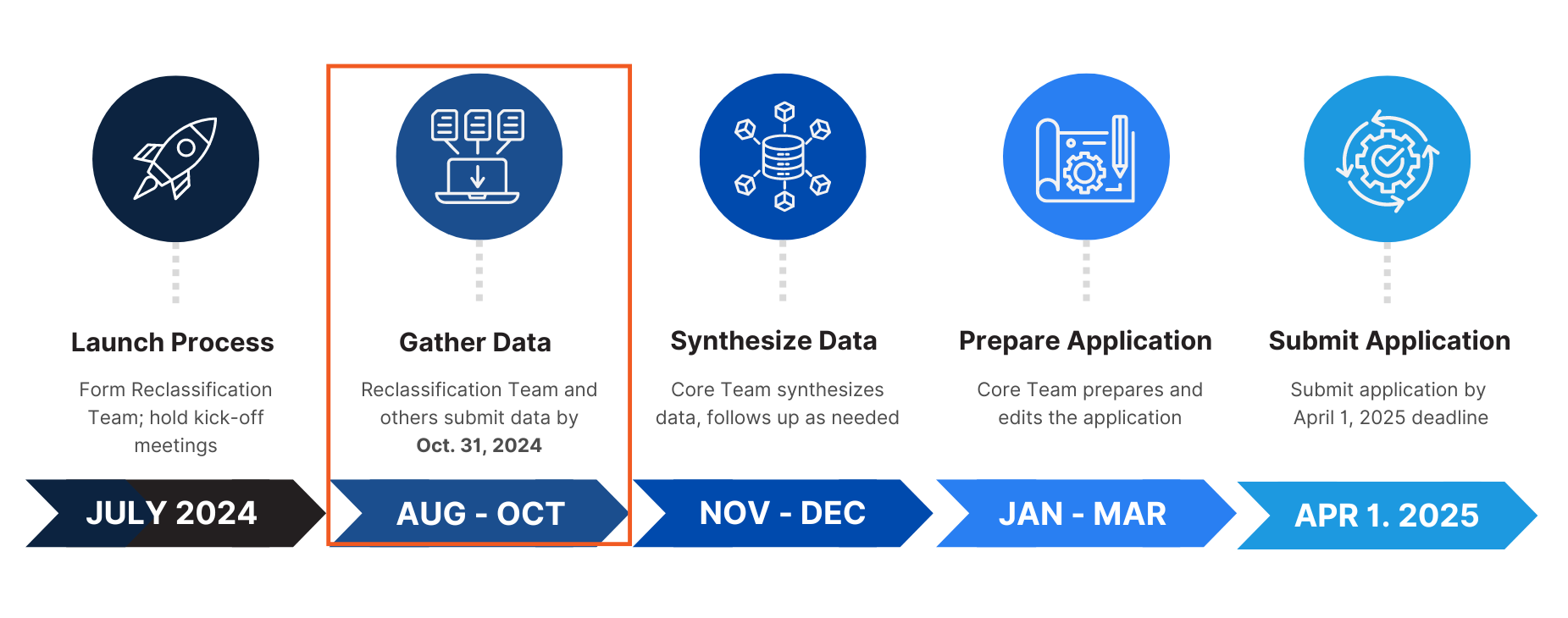
Carnegie Community Engagement Reclassification
Since 2015, The University of Texas at San Antonio has held the Carnegie Foundation’s Community Engagement Classification, validating the university's positive impact on the economy and the communities we serve. The university was reclassified in 2026 and is one of only 277 degree-granting universities in the U.S. to hold this national recognition for community engagement. The classification is valid through 2032.
Accomplished: 2026 Carnegie Community Engagement Reclassification
To retain its Community Engagement Classification from 2015, the university needed to reapply for the 2026 cycle.
The Carnegie Community Engagement Classification is voluntary and evidence-based, requiring institutional self-assessment followed by a national review to validate the full extent of community engagement. It involves data collection and documentation of important aspects of UT San Antonio's community engagement mission, identity and commitments.
The university underwent a comprehensive self-assessment during the 2024-2025 academic year, gathering evidence of deep, pervasive and integrated community engagement efforts that took place during 2023-2024 academic year.
Timeline:
- Process launched; Reclassification Team formed: July 2024
- Data gathering: August – October 31, 2024
- Application preparation: November 2024 – March 2025
- Deadline to submit application: April 21, 2025
- Reclassification announced: January 12, 2026

Reclassification Collective
| Name | Title | Office or Department | Division or College |
|---|---|---|---|
| Maria Alejandro | Director | Center for Civic & Community-Engaged Leadership | Academic Affairs |
| Ginnifer Cié Gee | Associate Vice Provost | Career-Engaged Learning | Academic Affairs |
| KC Gonzalez | Director | Academic Strategic Communications | Academic Affairs |
| Kasey Neece-Fielder | Associate Vice President for Strategic Planning and Assessment | Office of Strategy | Academic Affairs & President |
| Lorrie Smith | Assistant Vice Provost, Accreditation and Academic Programs | Academic Affairs | Academic Affairs |
| Dee Torres | Graduate Assistant | Center for Civic & Community-Engaged Leadership | Academic Affairs |
| Name | Title | Office or Department | Division or College |
|---|---|---|---|
| Cerise Edmonds | Executive Director | Center for Professional Excellence | Alvarez College of Business |
| Rosa E. Garza-Girdy | Assistant Dean of Student Services | Alvarez College of Business | |
| Genesis Valdez | Assistant Director of Experiential Learning | Alvarez Student Success Center | Alvarez College of Business |
| Alejandra Elenes | Chair | Race, Gender and Sexuality Studies | College of Education and Human Development |
| Liliana Saldaña | Associate Professor | Mexican American Studies | College of Education and Human Development |
| Juanita Santos | Executive Director | Dual Language Community Laboratory Schools Partnership | College of Education and Human Development |
| Rhonda BeLue | Associate Dean for Community Engagement & Partnerships | Public Health | College for Health, Community and Policy |
| Roger Enriquez | Associate Professor & Executive Director | Westside Community Partnerships | College for Health, Community and Policy |
| Erica Sosa | Professor & Co-Director | Center for Community-Based and Applied Health Research | College for Health, Community and Policy |
| Jiannan Cai | Assistant Professor | Civil and Environmental Engineering, and Construction Management | Klesse College for Engineering and Integrated Design |
| Ao Du | Assistant Professor | Civil and Environmental Engineering, and Construction Management | Klesse College for Engineering and Integrated Design |
| Cody Gonzalez | Assistant Professor | Mechanical Engineering | Klesse College for Engineering and Integrated Design |
| Alex Mejia | Associate Professor | Department of Biomedical and Chemical Engineering/Department of Bicultural-Bilingual Studies | Klesse College for Engineering and Integrated Design |
| Araceli Ortiz | Professor & Director | Biomedical Engineering & Chemical Engineering/Interdisciplinary Learning & Teaching/ Manuel P. Berriozábal Pre-Freshman Engineering Program (PREP) | Klesse College for Engineering and Integrated Design |
| Saadet Toker-Beeson | Associate Dean for Community Engagement | Klesse College for Engineering and Integrated Design | |
| Emilie Amrein | Professor, Associate Dean for Community Engagement & Executive Director | Interdisciplinary School for Engagement/ UTSA Arts | College of Liberal and Fine Arts |
| Jerry Gonzalez | Associate Professor & Director | Mexico Center | College of Liberal and Fine Arts |
| Michael Rushforth | Assistant Dean of Experiential Learning Initiatives | College of Liberal and Fine Arts | |
| Timothy Yuen | Professor, Associate Dean for Undergraduate Studies | Computer Science | College of Sciences |
| Hector Aguilar | Associate Dean for Academics | Honors College | |
| Lydia Bueno | Assistant Dean of Enrollment and Student Life | Honors College | |
| Renee Higgins | Senior Administrative Manger | Honors College | |
| Kristi Meyer | Assistant Dean of Special Programs | Honors College | |
| Jianwei Niu | Interim Executive Director | School of Data Science | |
| Brian Rendell | Senior Director of Academic Credentialing, Leadership Development, and Marketable Skills | University College | |
| Rebecca Schroeder | Interim Associate Dean | University College | |
| Jake Erney | Director Strategic Initiatives | Academic Innovation | Academic Affairs |
| Kelly Nash | Senior Associate Vice Provost of Faculty Affairs | Faculty Success | Academic Affairs |
| Blanca Pokorney | Director | Global Initiatives | Academic Affairs |
| Belinda Saldaña Harmon | Senior Director, Community Outreach | Strategic Enrollment | Academic Affairs |
| Jessica Dawson | Associate Dean of Students | Student Affairs | Academic Affairs |
| Amy Buechler-Steubing | Associate Vice Provost, Strategic Initiatives and Learning Innovation | Student Success | Academic Affairs |
| Cece Griffin | Assistant Vice President | Donor Engagement | Advancement & Alumni Engagement |
| Liz Rockstroh | Chief of Staff & Assistant Vice President | Business Affairs | |
| Kimberly Maldonado | Associate Vice President for Strategy & Executive Communication | Office of Strategy | Academic Affairs & President |
| Bob Bement | Assistant to the Associate Vice President | Institute for Economic Development | Research |
| Lori Shultz | Senior Associate Vice President | Research Administration | Research |
| Teresa Niño | Vice President | University Relations | |
| Vanessa Kenon | Associate Vice President | Technology Compliance and Community Engagement | University Technology Solutions |
What is Community Engagement?
According to the Carnegie Foundation, community engagement describes the collaboration between higher education institutions and their larger communities (local, regional/state, national, global) for the mutually beneficial exchange of knowledge and resources in a context of partnership and reciprocity.
Definition: Structured community-based or service activities for academic learning purposes.
Examples include:
- Projects in collaboration with community partners
- Student community-based research
- Community-based internships, clinical, fieldwork, student teaching
- Planning and implementation of service-learning activity
- Design, consultation, or creation of a community product or tool
- Pro bono services performed by graduate and professional students (e.g., consulting) in connection with a course or academic objective
Definition: Community service primarily focuses on service to the community, without a structured academic component.
Examples include:
- One-day or volunteer service projects
- Community presentations, performances, exhibitions done for the purpose of service
- Community-based internships, not related to academic courses
- Other activities in connection with grants classified as “Service grants” (that are otherwise not counted in the section above)
- Projects completed through federal community work-study students
The Carnegie Foundation is looking for institutional commitment to community engagement demonstrated through systems and structures that are deep, pervasive and integrated.
DEEP engagement demonstrates systems, structures, behaviors and outcomes that appropriately position all partners — students, faculty staff and community members — as co-educators, co-learners, and co-generators of knowledge.
PERVASIVENESS is demonstrated by extent to which community engagement is part of the plans, activities, and outcomes across the academic institution, such as within academic units, student services, communications, business affairs and other relevant areas.
INTEGRATION is demonstrated by the extent to which community engagement is embedded into the core, strategic and academic purposes and structures of the institution.
Questions?
Contact one of the core team members or send Maria Alejandro a message via the UTSA Engaged platform.